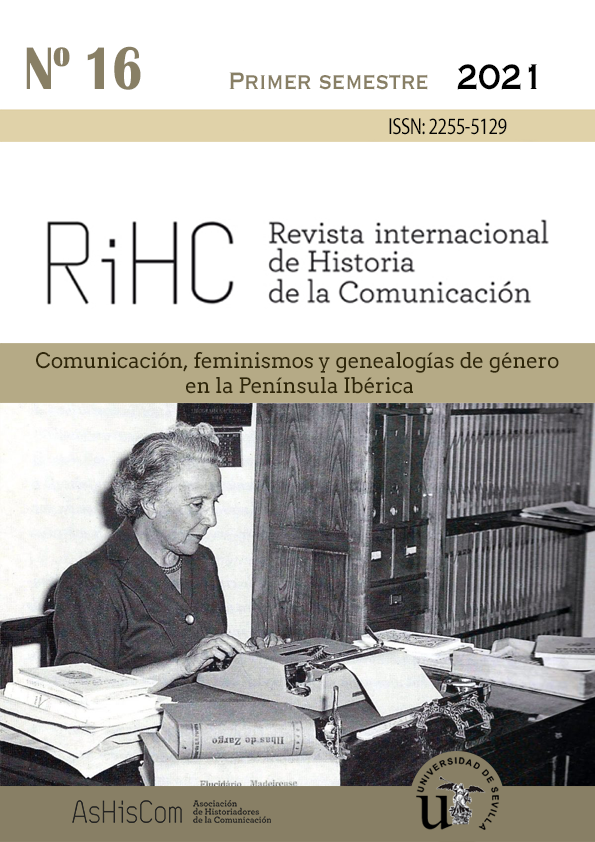Female Journalistic Chronicles: impressions of an unstable daily life at the end of the Estado Novo
DOI:
https://doi.org/10.12795/RiCH.2021.i16.05Keywords:
Chronicle, Portuguese women writers, Women, Journalism, FeminineAbstract
In the final years of the Estado Novo dictatorship, even with the prior censorship and other constraints, the periodical press played a relevant role in raising critical awareness, particularly in terms of raising awareness of the place and identity of women. Through a "corpus" of three books of chronicles written at that time by three writers (Maria Judite de Carvalho, Agustina Bessa-Luís and Maria Teresa Horta), we seek to develop a reflection around the problematisation of the issue of women, through the flexibility and openness of the genre of the chronicle, simultaneously journalistic and literary. Adopting different styles, the three writers make an appreciable contribution to this reflection on the feminine condition, a much-discussed issue at the time.
Downloads
References
BARRENO, M. I.; Horta, M. T.; Costa, M. V. (2010): Novas Cartas Portuguesas, Lisboa, D. Quixote (ed. anotada; org. Ana Luísa Amaral).
BAPTISTA-BASTOS, A. (1975): “Maria Judite de Carvalho: uma ternura magoada”, in Maria Judite de Carvalho, A Janela Fingida, Lisboa, Seara Nova, pp. 11-18.
BESSA-LUÍS, A. (1996): A Alegria do Mundo, I (Escritos dos anos de 1965-1969), Lisboa, Guimarães Editores.
CANDIDO, A. (1992): A vida ao rés-do-chão, in Candido, A. (org.). A Crônica: o gênero, sua fixação e suas transformações no Brasil, São Paulo, Ed. Unicamp; Rio de Janeiro, Fund. Casa Rui Barbosa, pp. 13-22.
CARMO, C. I. (ed.) (2018): A Visagem do Cronista: antologia de crónica autobiográfica portuguesa (séculos XX-XXI), 2 vols., Lisboa, Arranha Céus.
CARVALHO, M. J. (1979): O Homem no Arame, Amadora, Bertrand.
–– (2019), A Janela Fingida [1975], in Obras Completas, vol. IV, Coimbra, Minotauro.
CERTEAU, M. (2004): L’Invention du Quotidien, vol. 1. Paris, Éd. Gallimard.
COSTA, M. V. (1973): Desescrita, Porto, Afrontamento.
FERNANDES, A. R. (2019): “Quotidiano Instável: dispersão ou coesão?”, in Maria Teresa Horta, Quotidiano Instável, Coimbra, Minotauro, pp. 9-15.
FRANCO, G. (1993): A Censura à Imprensa (1820-1974), Lisboa, Universidade Católica Portuguesa-Imprensa Nacional.
HORTA, M. T. (2019): Quotidiano Instável: crónicas (1968-1972), Lisboa, D. Quixote.
LINDIM, I. (2012): Mulheres de Armas: histórias das brigadas revolucionárias – as acções armadas, os riscos, as motivações (Pref. de Isabel do Carmo), Lisboa, Objectiva.
LISPECTOR, C. (2018): Todas as Crónicas, Lisboa, Relógio d’Água.
MAGALHÃES, I. A. (1989): O Tempo das Mulheres, Lisboa, IN-CM.
MOURA, R. L. (2018): O Jornalismo nas Narrativas das Crônicas de Rachel de Queiroz e Maria Judite de Carvalho [Tese de doutoramento], Porto Alegre, PUCRS.
MORÃO, P.; RIBEIRO, C. A. (eds.) (2015): Maria Judite de Carvalho – Palavras, Tempo, Paisagem, Famalicão, Húmus / CEC.
PALMA-FERREIRA, J. (1970): “Crítica a Ambas as Mãos sobre o Corpo”, in Suplemento “Literatura & Arte”, jornal A Capital, de 30 de Dezembro de 1970, pp. 3 e 6.
PAULO, H.; Torgal, L. R. (2015): “Cidadania, Nacionalismo e Propaganda Política”, in Ana Teresa Peixinho (et alii), 20 Anos de Jornalismo contra a Indiferença, Coimbra, Imprensa da Univ. de Coimbra, pp. 169-188.
PIMENTEL, I. F. (2000), História das Organizações Femininas no Estado Novo, Lisboa, Círculo de Leitores.
PIMENTEL, I. F. & MELO, H. M. (2015): Mulheres Portuguesas, Lisboa, Clube do Autor.
PRATA, A. F. (2010): Práticas Narrativas da Cidade. Crónicas Urbanas de Carlos Drummond de Andrade, Maria Judite de Carvalho e Jacques Réda. Dissertação de Doutoramento em Estudos Literários – Literatura Comparada. Lisboa: Universidade de Lisboa. Disponível online (20.03.2021): http://repositorio.ul.pt/handle/10451/3048
RAMOS, R. (coord.) (2015): História de Portugal, 8ª ed., Lisboa, Esfera do Caos.
RODRIGUES, G. A. (1980): Breve História da Censura Literária, Lisboa, ICALP / Biblioteca Breve.
ROSAS, F. (1994): História de Portugal – O Estado Novo (1926-1974), vol. 7, José Mattoso (dir.), Lisboa, Círculo de Leitores.
¬–– (2015): Salazar e o Poder: a arte de saber durar, Lisboa, Tinta da China.
TENGARRINHA, J. M. (2006): Imprensa e Opinião Pública em Portugal, Coimbra, Minerva.
Downloads
Published
How to Cite
Issue
Section
License
Copyright (c) 2021 RIHC. Revista Internacional de Historia de la Comunicación

This work is licensed under a Creative Commons Attribution-NonCommercial-ShareAlike 4.0 International License.
RiHC. Revista internacional de Historia de la Comunicación is an open access publication, offering its content under the principle that making research available to the public free of charge contributes to the greater exchange of global knowledge.
RiHC. Revista internacional de Historia de la Comunicación adheres to the various initiatives that promote access to knowledge. All content is therefore free of charge and is published under the Creative Commons Attribution-NonCommercial-ShareAlike 4.0 International license.
By virtue of this, the authors who publish in this journal accept the following conditions:
- Open access content may be freely shared (that is, copied and redistributed in any medium or format) and adapted (remixed, transformed and built upon).
- Attribution: The user of the content must give appropriate credit, provide a link to the license, and indicate if changes were made. This may be done in any reasonable manner, but not in any way that suggests the licensor endorses the user or their use.
- Non Commercial: The content may not be used for any commercial purpose.
- Share Alike: If the content is remixed, transformed or built upon, it must be distributed under the same licence as the original.
- No additional restrictions: No legal terms or technological measures may be applied that legally restrict others from doing anything the licence permits.



